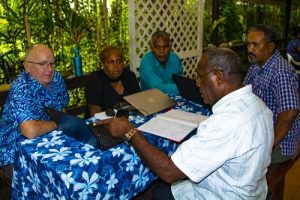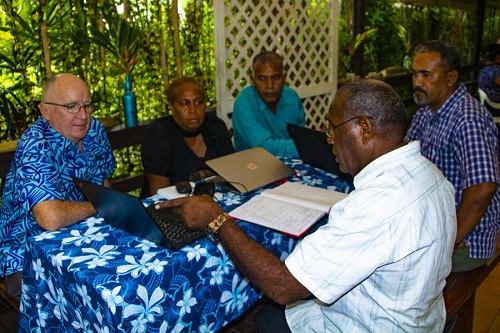 The Food and Agriculture Organisation (FAO) of the United Nations and Pacific Community (SPC) met with national stakeholders from Samoa, Solomon Islands and Fiji this week to discuss the serious threat of pests and diseases for Pacific agriculture.
The Food and Agriculture Organisation (FAO) of the United Nations and Pacific Community (SPC) met with national stakeholders from Samoa, Solomon Islands and Fiji this week to discuss the serious threat of pests and diseases for Pacific agriculture.
The meeting was an opportunity for the three participating countries to highlight the enormity of the pest and disease issue, and how it is impacting biosecurity and nutrition security efforts across the Pacific. Participants discussed the need to take a regional approach to research in order to improve agricultural and biosecurity approaches toward building a more resilient Pacific.
In her opening remarks, SPC’s Deputy Director General, Dr Audrey Aumua, stated that the increasing number of agricultural pests and diseases was pushing farmers towards the use harmful pesticides and chemicals, which posed even more harmful environmental and health risks. She stressed the need to ensure that farmers had a full understanding of full range of safe adaptation and mitigation tools at their disposal.
Dr. Aumua also noted the risks to Pacific agriculture from climate change saying, ‘Climate change is a major contributor to the increased threats of transboundary plant and animal pests, diseases and invasive species. Integrated approaches ensure the food and nutrition security of the people in the Pacific is not compromised.’
FAO’s Climate Change Officer, Ana Tiraa echoed this view noting that climate change adds a layer of complexity to forecasting and controlling biosecurity risks and impacts. Ms. Tiraa highlighted that the primary drivers for the dynamics of plant and animal pests are weather and climate change. Yet, despite the increase in food pests and diseases in recent times and the devastation caused on food security, scant information is available regarding the impact of climate change on pests and diseases.
“Although the Pacific Islands are considered the most vulnerable to the impacts of climate change, it is clear that we need to better understand the problems and gaps in knowledge that exist, and significantly, how to address these problems,” said Ms. Tiraa.
Based on the feedback provided at this meeting, along with other consultations across the region, SPC and the FAO Technical Cooperation Programme will develop a comprehensive initiative to improve national capacities to address climate change impacts on biosecurity and food security.

